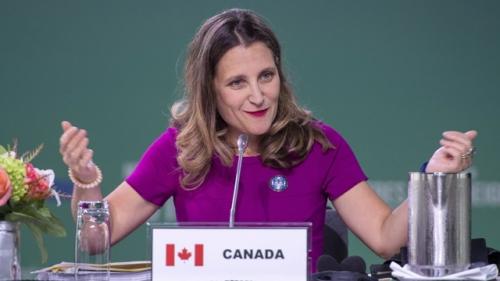
https://www.canada.ca/en/global-affairs/news/2018/09/address-by-minister...
Speech
September 22, 2018 - Montréal, Quebec
Check against delivery. This speech has been translated in accordance with the Government of Canada’s official languages policy and edited for posting and distribution in accordance with its communications policy.
I want to welcome again my colleagues, the foreign ministers who are here with me, and especially Federica Mogherini, who organized this meeting with me—with Canada.
I would like to start by pointing out that we are on the ancestral territory of the Mohawk nations. I would also like to take a moment to note that, while we have talked about different situations around the world, we have also recognized and discussed our relationship with Indigenous communities in Canada, and particularly with Indigenous women. We acknowledged the milestone achieved yesterday in the National Inquiry into Missing and Murdered Indigenous Women and Girls as well as on criminal justice mechanisms.
That being said, we still have a lot of work to do to eliminate all forms of violence against women. This work must continue. Over the past two days, women foreign ministers from around the world gathered here in Montréal to discuss key foreign policy issues and pressing challenges facing the world.
Questioning the state of the world is nothing unusual for foreign ministers. It is natural for us at home to try to build a better world for our people. This meeting represents an historic opportunity for us, women foreign ministers, to apply a feminist perspective to issues related to the international rules-based order: international security, development and inclusive economic growth, the strengthening of democracy and the protection of human rights, as well as the fight against sexual and gender-based violence.
A meeting like this allows us to send a powerful message to the world: that all women, regardless of their level of involvement in the development of their societies, have a key role to play in finding solutions to the political, economic and social challenges facing our societies. The gains that we have achieved today should not be taken for granted, but rather we should continue to fight to make them permanent.
Without women fully engaged in the decision-making process, we cannot have equitable development of our societies and we cannot achieve the peace and prosperity we aspire to. In any case, women's involvement is not just about bringing something more to our societies; this is a matter of fundamental human rights.
Therefore, I would like to thank all my colleagues who came here to Montréal, especially the High Representative of the Union for Foreign Affairs and Security Policy, my friend Federica Mogherini, who helped immensely in setting up this meeting and who was my co-chair.
This meeting addressed some of the most pressing issues in the world today such as Syria, Ukraine and the genocide of the Rohingya. We know that the empowerment of women and girls makes us all safer and is a central part of resolving those key international crises and many others. That is why Canada has a feminist foreign policy. We are also pursuing an ambitious agenda to deliver results. We have made gender equality a priority of our G7 Presidency this year and at the G7 Summit in June, we helped to secure a $3.8-billion investment in education for women and girls in crisis and conflict situations.
We have heard, over the past two days, from our fellow foreign ministers and civil society leaders how important these kinds of investments are in the world today. Canada is also pursuing a Feminist International Assistance Policy. We are leading the Elsie Initiative for Women in Peace Operations and have a new action plan on women, peace and security.
In the context of this action plan, international and domestic civil society organizations that are committed to feminism have been telling us that Canada needs to be even more ambitious. One way to achieve that goal is to have a high-level champion for these issues. That is why I am delighted today to announce that our government will create a new ambassadorial position, an ambassador for women, peace and security. I am very excited about this role.
I am also announcing that Canada is supporting a number of new projects that aim to strengthen the active and meaningful participation of women in peace processes, help the investigation of sexual and gender-based crimes, build sustainable and inclusive peace, and advance women's empowerment and gender equality in developing countries.
Partnerships with other countries to advance a feminist foreign policy agenda are essential. This is why I am also announcing that in 2020, the 20th anniversary of the landmark UN Security Council Resolution 1325 on Women, Peace and Security, which was discussed over the past two days, Canada will co-chair the Women, Peace and Security Focal Points Network alongside Uruguay. As you might expect, there is enormous enthusiasm, particularly among the group of women gathered here in Montréal, for this work.
Women and girls should not face intimidation, abuse or worse for standing up for their rights. Women and girls should have equal rights, respect and representation, as well as equal access to leadership positions and opportunities. Working together, we can make this a reality. Advancing gender equality is one of the most important ways for our societies to become stronger, our economies and our middle class more prosperous and our countries, and indeed the entire world, more peaceful and secure.
I am so glad and so grateful that my colleagues from all over the world were able to join us here in Montréal to talk about these issues as well as how we can do more together. I truly believe, dear friends, that this is really just the beginning.










Add new comment